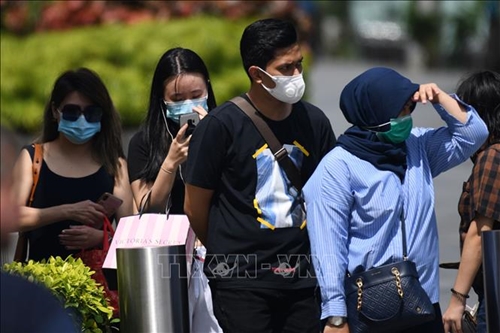The measure is among the additional precautions Singapore is taking to prevent the spread of the COVID-19 outbreak.
With the ban, Singaporeans, residents and long-term pass holders who have been to these epidemic-hit areas in the past 14 days will be allowed in, but must go into self-quarantine for 14 days.
    |
 |
|
People wear face masks to prevent COVID-19 in Singapore |
Singaporeans have also been advised to defer non-essential travel to Iran, northern Italy, the RoK and Japan where cases have spiked.
At checkpoints, travellers entering Singapore who have a fever or other symptoms of respiratory illness may be required to undergo a coronavirus swab test. The test results could take between three and six hours. Those who test positive for the virus will be taken to hospital in an ambulance.
As a negative result does not completely rule out the possibility of infection, those tested negative should continue to minimise social contact and seek medical attention should symptoms not improve over the next three days.
As of March 4 morning, Singapore has confirmed 110 infected cases, of which 78 have fully recovered and been discharged.
Meanwhile, the Health Ministry of Indonesia has said it will assign its regional labs to test people suspected of carrying the novel coronavirus amid concerns that it has not been proactive enough in detecting infected people to prevent its spread.
The ministry previously insisted that only its Health Research and Development Agency (Balitbangkes) be authorised to conduct throat swab tests and announce the result.
The policy change was made after Indonesian President Joko Widodo announced on March 2 that two Indonesians had been diagnosed with the COVID-19.
The patients, a mother and her daughter from Depok City, are believed to have contracted the virus after the latter interacted with an infected Japanese patient who visited Jakarta last month.
Indonesia will now test not only those showing COVID-19 symptoms and having recently traveled to affected countries such as China, the RoK and Iran but also those having had contact with coronavirus-positive people even though they show no symptoms.
The country has only tested samples of 155 suspected cases, two of which have come back positive.
Source: VNA